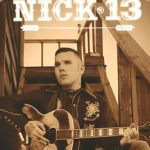Everyone has their own Johnny Cash. For me, he first appeared in a comic book. It was said about country music in three frames: Hank Williams – Nashville, Johnny Cash – Cashville, Willie Nelson – Trashville. But in the mid-1990s, there was no Internet, and personal computers were rare, so for the first time I heard Johnny on Radio 101 on Boris Simonov’s program “Transylvania worries.”

When Kirill Turitsyn and I were just starting to create a rockabilly movement in the Urals, he gave me a cassette with the album “Solitary Man. American III”. It felt like a frisky horse had kicked me in the head-I had never heard anything more powerful at that time, and perhaps even to this day. I stuck this record wherever there was a record player, and listened until people around me started shouting, “Turn off this dying old man!” Then I would send everyone to Devil and make the “Mercy Seat” louder:
“An eye for an eye
And a tooth for a tooth
And anyway I told the truth
And I’m not afraid to die.”

When I met Taras Trofimov, we immediately agreed on the love of Johnny Cash’s music. We even agreed to put one of his songs in each of our albums. However, this agreement was soon forgotten, and only the first two recordings feature “Hey Porter” and “Big River”. But “Folsom Prison Blues” did not come out of the concert sets of The Stockmen. I remember the day Cash died. We had a performance at the soulful tavern “Tradition”, Taras was already drunk and upset (tellingly, Johnny’s birthday falls on February 26th, and Taras’s on the 27th), and then two American bikers showed up at the hangout. When we told them the tragic news, they started giggling like your Beaver and Butthole. I don’t remember why we never got rid of those basterds.

If Buddy Holly streaked across the musical sky like a meteor, then Johnny Cash happened to have plenty of time to scatter a rake and step on every one. His marriage to June Carter saved him. I had the honor to perform with her cousins, the Carter brothers, and I taught Danny how to drink Russian vodka (since his arrival, his American friends had been pestering him with the question, had he tried vodka yet? He tried it. He liked it). I didn’t ask Danny any questions about Johnny, but I did find out all about Rick Rubin. It looks like I had Napoleonic plans.
Suddenly, every radio station started playing Johnny Cash’s “Personal Jesus” version, and every slouchy dog started flaunting the fact that they were listening to the Genius of country music. Johnny Cash has become fashionable. At the same time, the biopic “Walk The Line” appeared on wide screens, where Cash was played quite talented by Joaquin Phoenix, although not without kinks. However, there was no social explosion, Johnny Cash remained an idol for the “chosen” jerboa and genuine connoisseurs. A few years later, out of the blue, the aforementioned movie “Stilyagi” (aka Hipsters) would make a splash, girls in ridiculous clothes would start dancing “to Elvis Presley,” without even thinking that Elvis couldn’t sound like John Fogerty. Johnny Cash’s voice, timbre and singing style probably saved thousands of souls, because he often sang about the lost and for the lost.

Alex Kervey is another matter. Translator and founder of the legendary “orange” series, which published books by the unfortunate degenerate Chuck Palahniuk. I know at least two people who ended up being brainwashed by the fucking Fight Club. Alexander Krivtsov, who chose the pseudonym Kervey, has a rich biography of affairs and events. So rich that Wikipedia itself suggests deleting any mention of it. However, now Alex has taken up a truly godly task. I dreamed of buying a biography of Johnny Cash, but I could not even imagine that I would have an autobiography in my hands! The book was published superbly: good translation, good paper, the lyrics of all his songs are given with Russian footnotes, a brief overview of the full discography, rare photos along with replicated photos. For this work, I would like to bow low to Kervey/Krivtsov and Igor Shadenkov, a rockabilly functionary who contributed a lot to the publication. When you read the lines, it seems as if Cash is still alive, he is in the same room with you, you can hear his low velvety baritone. And the cats freeze, and goosebumps continue to run under the black shirt…

In other words, this publication is necessary for the library of every self-respecting music lover, and just a curious person. After all, a curious person can’t help but love Johnny’s music from the very first start.
PS: If it goes well, the next book will be about Elvis.













